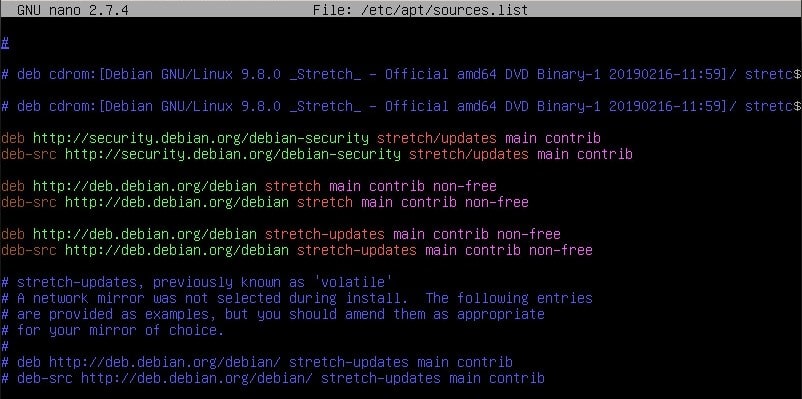
I understand the differences between wheezy / stable / testing etc. Are there any packages that are in that are not in /debian? And vice versa?Īfter the repository URI comes the component. What's the point of having several repositories ( and )? I keep reading documentations about apt, but I don't find any explanations. My sources.list looks like this : deb wheezy mainĬan I remove the lines starting with "deb-src"? Am I correct if I say I don't need packages sources unless I want to modify them myself (which, obviously, i'm just not able to do)?
DEBIAN SOURCES.LIST UPDATE
If I understand well, when doing apt-get update & apt-get upgrade, apt will retrieve updates of my installed packages in the repositories listed in /etc/apt/sources.list.
DEBIAN SOURCES.LIST HOW TO
I just got a private virtual server to host my websites, and i'm currently learning how to correctly secure a webserver. The key ID used to sign current Debian package repositories on CRAN has ID 0xB8F25A8A73EACF41, key fingerprint 95C0FAF38DB3CCAD0C080A7BDC78B2DDEABC47B7 and user ID Johannes Ranke. These packages are: r-cran-bootīackports of the following packages are also supplied and kept up to date in the same manner: littlerĪny help is welcome in case you would like to see additional packages here.

sources depending on the contained format.

Filenames need to have either the extension.

Two different file formats are allowed as described in the next two sections.
DEBIAN SOURCES.LIST INSTALL
Client computers can connect to the repository to download and install the packages using an Apt -based. Little explanation about the domain name change, Debian asked. A Debian repository is a set of Debian binary or source packages organized in a special directory tree and with various infrastructure files - checksums, indices, signatures, descriptions translations. The packages recommended by the R core team ( r-recommended) are updated in the Debian repositories on CRAN upon each new release of R (at least for the main architectures amd64 and i386). The /etc/apt/ directory provides a way to add sources.list entries in separate files. You must edit your /etc/apt/sources.list to replaces the old repository name by the new one. Therefore, updates of a subset of these R related packages are provided here for such Debian releases.

Backports on CRANĪs R and related packages are currently not part of the official Debian backports repositories like buster-backports (please contact r-sig-debian if you would like to change this), the R versions in released or frozen Debian releases get out of date. Local directories or CD/DVD are also accepted. A repository is generally a network server, such as the official DebianStable repository. This means that packages installed from within R take precedence over the ones installed via the Debian package management system if you happen to have two versions installed at the same time. Apt downloads packages from one or more software repositories (sources) and installs them onto your computer. On Debian and Ubuntu, R_LIBS_USER is set in /etc/R/Renviron to R_LIBS_USER=$ In order to find packages, R looks at the variables R_LIBS_USER and R_LIBS_SITE. If you would like to update R packages that have been installed via the Debian package management system which are installed somewhere under /usr/lib/, I would recommend to do this the Debian way using the source packages from Debian unstable.


 0 kommentar(er)
0 kommentar(er)
